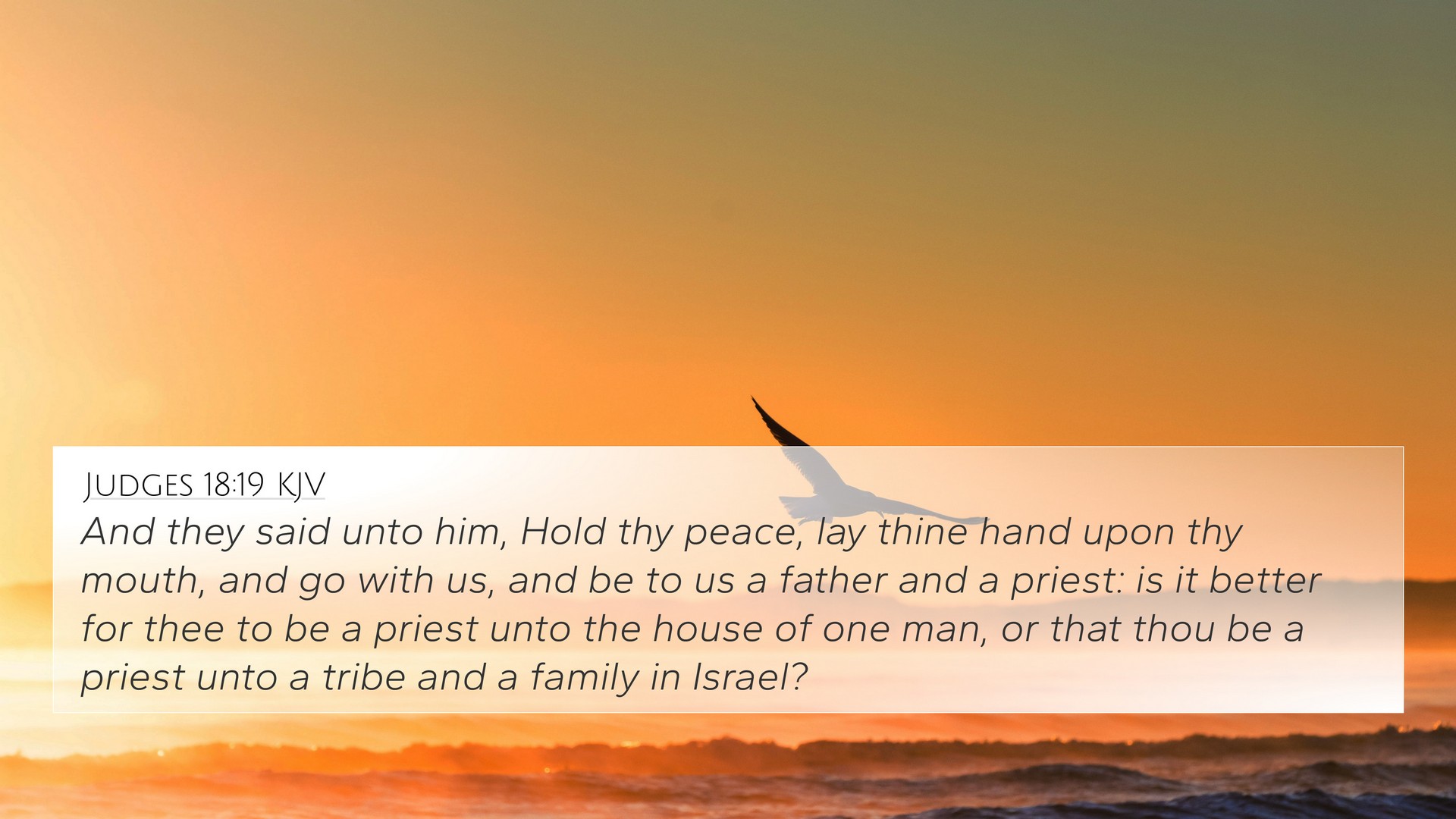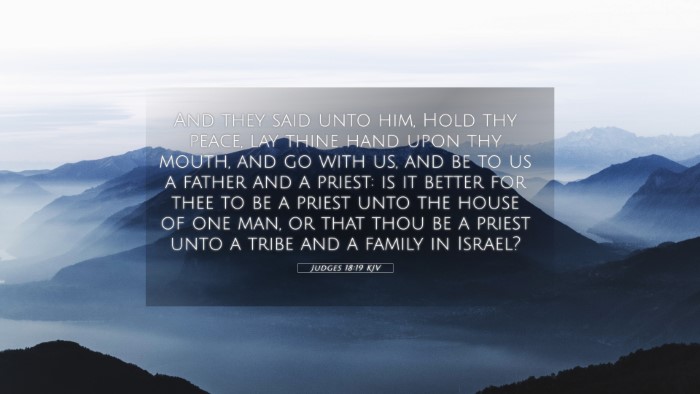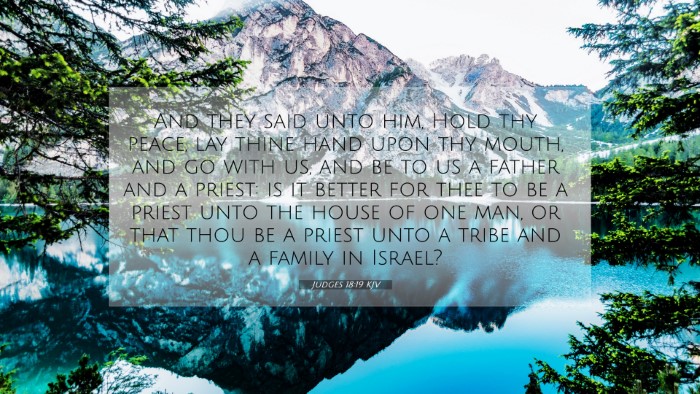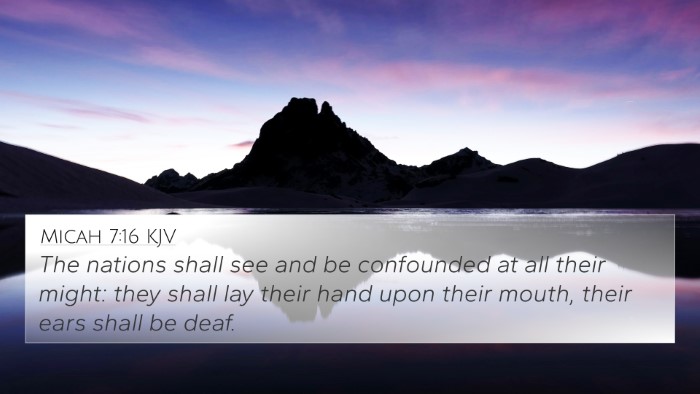Meaning of Judges 18:19
Judges 18:19 is a verse that captures a significant moment in the narrative of the Danites as they sought to establish their own place within Israel. The verse reads:
"And they said unto him, Hold thy peace, lay thine hand upon thy mouth, and go with us, and be to us a father and a priest: is it better for thee to be a priest unto the house of one man, or that thou be a priest unto a tribe and a family in Israel?"
Summary of Insights
This verse reflects a dialogue between the Danites and a Levite, highlighting themes of loyalty, service, and the quest for identity within the community of Israel. Below is a summarized interpretation based on insights from public domain commentaries:
- Matthew Henry: This commentary suggests that the Danites' question indicates a search for broader influence and importance in their religious practice. They entice the Levite by offering him a position of greater status rather than remaining one of mere local significance.
- Albert Barnes: Barnes emphasizes the Levite's willingness to serve this larger branch of Israelite society as indicative of his ambition. The lure of a 'father and priest' position implies both leadership and belonging, reflecting a desire among the Danites to establish their own identity separate from other tribes.
- Adam Clarke: Clarke notes the ironic focus on the Levite’s role, suggesting that even in rebellion (as the tribe of Dan had appropriated territory not theirs), they sought divine favor through priestly roles. The request highlights an infusion of personal ambition into communal religious affairs.
Thematic Analysis of Judges 18:19
The complexities of this verse extend into several broader themes:
- Authority and Identity: The question posed by the Danites not only showcases their ambition but also raises the issue of proper authority in worship and religious service.
- Religious Leadership: The appeal to the Levite illustrates the importance of priestly functions within Israel and how individuals and tribes vied for access to spiritual leadership.
- Community and Belonging: There is a clear dichotomy presented between individual loyalty and tribal allegiance, signifying deeper social dynamics at play within the nation of Israel.
Cross References
Understanding Judges 18:19 can be enriched by examining various Bible cross-references. Here are several verses that relate to themes of authority, priesthood, and tribal identity:
- Numbers 3:6-10 - Discusses the roles of the Levites and their service in the Tabernacle.
- Deuteronomy 18:1-2 - Addresses the inheritance and roles of the priests among the Israelites.
- Joshua 19:40-48 - Details the allocation of territories among the tribes of Israel, including the tribe of Dan.
- 1 Samuel 2:12-17 - Illustrates the corruption of the priestly class, emphasizing the importance of faithful service.
- Ezekiel 44:10-14 - Speaks to the qualifications of priests and the consequences of unfaithfulness.
- Hebrews 5:1-4 - Discusses the high priestly role in a Christian context, connecting Old and New Testament themes of leadership.
- Matthew 23:6-7 - Jesus critiques the desire for prestige and titles among religious leaders, echoing the themes present in Judges 18:19.
Concluding Thoughts
The interplay of these themes and cross-references invites deeper reflection on the nature of leadership and service within both the ancient and contemporary faith communities. By examining these connections, one can develop a richer understanding of how the verses interact with each other and provide insights into the life and practice of faith.
Tools for Understanding
For those engaged in deeper study, consider utilizing:
- Bible concordance: A tool for finding verse references and exploring related topics.
- Bible cross-reference guide: Provides a systematic way to discover interconnected scriptures.
- Comprehensive Bible cross-reference materials: Useful for those preparing sermons or in-depth studies.
How to Utilize Cross-references Effectively
When studying the Bible, these methods can enhance your understanding:
- Identifying connections between Old and New Testament: Uncover shared themes and teachings.
- Comparative study of Pauline epistles: Evaluate similarities and differences in theological emphasis.
- Cross-referencing Psalms with New Testament teachings: Explore rich parallels that reveal holistic messages of scripture.
Encouragement for Further Study
Continue exploring the rich tapestry of Biblical texts through cross-referencing. The connections you discover can illuminate themes and provide greater context for specific verses, enriching your spiritual journey and scriptural understanding.












